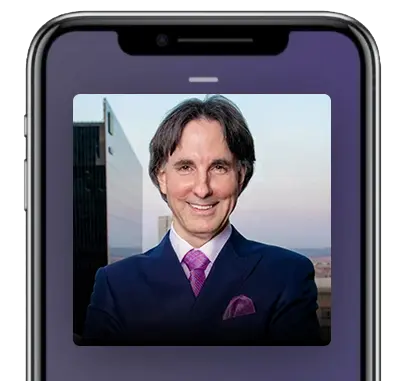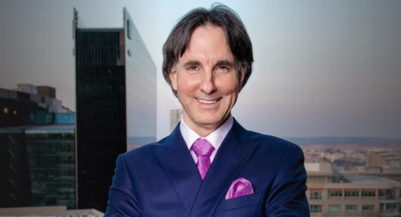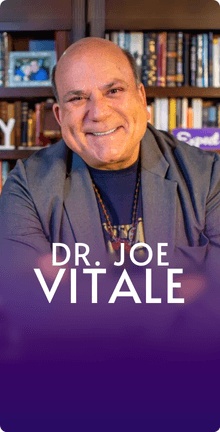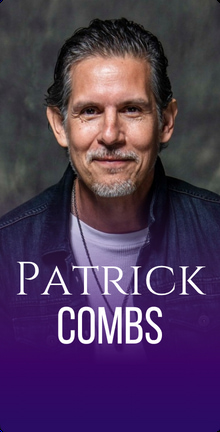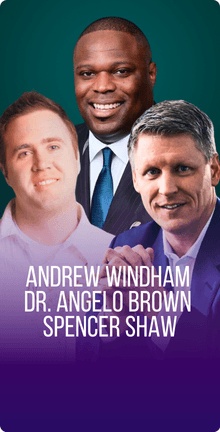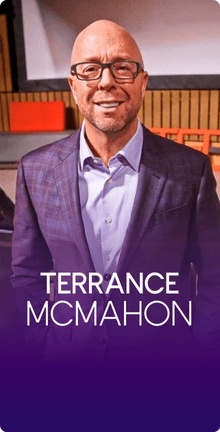In this Episode
- [03:35]Dr. John Demartini mentions the importance of small, meaningful podcasts and shares a story about a sentimental podcast with a former student’s daughter.
- [08:43]Dr. Demartini emphasizes the importance of asking the right questions to reveal hidden order and authenticity.
- [18:22]Dr. Demartini describes a transformative experience from a breakthrough program in Sydney, where a participant reconciled with his estranged father.
- [29:04]Dr. Demartini discusses the role of the amygdala and hippocampus in assigning valency to events and how this affects our perceptions.
- [49:03]Stephan emphasizes that everything in our lives is guiding us to our most authentic state and that we should see obstacles as opportunities.
- [51:46]Dr. Demartini discusses the importance of comparing our daily actions to our own spiritual path rather than comparing ourselves to others.
John, it’s so great to have you back on the show. Thanks for coming.
Thanks for having me, and looking forward to it.
You’re currently in London. What are you doing there?
Well, I just finished presenting one of my signature programs, The Breakthrough Experience. I’ve been doing some podcasts and engaging in the normal activities I love, which include researching and writing. In a few meetings, I have a meeting with one of the famous comedians from here tomorrow, so I’m looking forward to that. He’s a character.
That’s awesome. You do a lot of podcasts. How many podcasts are you doing today, for example?
Today I’m doing three. Friday, I did three. The day before, I did two—the day before I was formally. I’ve done one to five a day, but on some days when I’m teaching, we don’t have time to do them, like on weekends or something. However, I do quite a few podcasts.
How many do you do in a year?
It could be up to 300 or 350. Sometimes it’s somewhere between 250 and 350, or in that range.
That’s amazing. You’ve been doing this for years. This isn’t just a sprint you’re doing for the launch of a book or something. This is a long-haul marathon that you’re doing for hundreds and hundreds of years.
Anything you're having difficulty loving outside reflects what you're not loving inside. Share on XI’ll do it; almost all my publicists and directors have been trying to ensure it reaches a certain number to proceed. But sometimes, someone contacts me who is the daughter of one of the students I had 40 years ago. I remember when she was born. I’ve known the family, and she said, “Will you come on and do the thing?” She doesn’t have big numbers and ratings, but she has sentimental value. I’m being told not to do small ones. You’ve got to do only the big ones. But sometimes there’s meaning to time. Sometimes those small ones become big ones. I just try to take advantage of every opportunity to share with people. I’ve done some that are millions and some that are smaller. I just do them.
I do small shows too. I just rely on my intuition because I know it’s not about the numbers. If you wrote a book that took you a long time to complete and didn’t have huge sales numbers, but it reached the right people, remember that everything always happens with divine precision. Those who were meant to receive the message did, and it saved or transformed their lives. That’s enough, it’s not about a numbers game. If you zoom out and look at the bigger picture of why we’re here and how this game of life actually works, it’s not about achieving bestseller status.
Can I share a story that was a tearjerker to me the other day? In fact, that may come up when I say it, but 39 years ago, I was giving a presentation in a public speaking class. I can’t say I’ve done a lot of those, but I did one back then because some people asked me, seeing that I was speaking quite extensively at the time. There were some really lovely people, but only 17 showed up. One of them was Thomas Leonard, the founder of coaching, also known as the ‘Father of Coaching’, and his partner is Sandy Vilas. They created Coach U and CoachVille, and the International Coaching Federation, from which the entire coaching movement around the world started.
The questions you ask are what make the unconscious conscious. When we are unconscious of things, we have missing information.
They came and they said, “Well, we want to learn to speak, and we have an idea, and we would like to create coaching like they do in sports for corporations and for individuals.” One individual, Thomas Leonard, arrived and mapped out his global vision for what he wanted to achieve: teaching, sharing his knowledge, becoming a speaker, and bringing coaching to the world. I knew that I remembered them. But just the other day, last Wednesday morning, when I was about to fly to London, Sandy Vilas, the co-founder, called me and said, “Thank you for that public speaking class.” Now I could have canceled that class because there were only 17 people. But because I did that class, the entire coaching movement emerged.
Thirty-nine years later, a guy called me and said, “Thank you. I’ve done 3000 speeches since that day.” We now have 51,800 coaches in our coaching federation, thanks to the efforts made in that class. Now, the truth is that the class just taught them how to speak. They did everything, it was just one of those things that I almost canceled the class because only 17 people were attending. It wasn’t the most viable option, but it was meaningful because the lady who asked me to do it offered to do it in her own office, which is an interior design office. She brought the people together, including Monte Pendleton, who initiated mentoring programs worldwide, and Tony Buzan, who developed mind mapping.
They launched their functions out of that class. I also did a Breakthrough Experience program for four people one time. I thought, ‘What am I doing? This is crazy.’ But one of those individuals has been with me now for 37 years and has been one of my assistants, colleagues and friends all these years. Sometimes we can arbitrarily, I suppose, proudly pass up opportunities because we’re too quick to exaggerate ourselves. I’ve certainly done that.
It’s all done with divine orchestration. The people that are meant to be in our lives, and we’re meant to be in their lives. It’s all meant to be collaborative, and one plus one equals three, five, or any other number. It’s all known, ordained and orchestrated.
It’s very, confusing, very chaotic. That’s what I love, helping people see, because the quality of your life is based on the quality of the questions you ask. The questions you ask are what make the unconscious conscious. When we are unconscious of things, we have missing information, which is the definition of entropy, disorder and information theory. But if we ask the question, become conscious of what we’re unconscious of and fill in the missing information, we can see the hidden order that’s there, or the divine order, the impure order, whatever we want to call it.
That revelation is inspiring. It’s a confirmation of authenticity when we have an ‘aha’ moment, a gamma synchronicity in their brain, as they call it, which liberates us from emotional judgments and the vicissitudes of incomplete awareness. It’s fantastic to be able to ask questions and discover this hidden order. But sometimes, as Wilhelm once says, “Instead of having simultaneous awareness and being fully conscious, we have sequential awareness, and it takes us a period of time to find out the other side that we missed.” We have the wisdom of the ages with the aging process instead of the wisdom of the ages without it.
Some of these opportunities that were given, which we chose not to take because of whatever reason — selfish, lazy, or just tired — my understanding is that we get to see what we could have been after we pass. Our life review happens; we get to know that kind of choose-your-own-adventure book, where here’s what would have happened if you’d made choice B or choice C.
We get to play all those out and experience what those would have been like. One of the hardest things to experience going through that life review, from my understanding, and from people who have had near death experiences, is what you could have been and not the mistakes that you made that you’re regretful for, but the things that you could have been and the person you could have become, but you just didn’t step up.
You’re not a victim of your past. You’re the master of your destiny. Share on XWhen I was 18 years old, I carpooled with a gentleman to Wharton Junior College, where I was going to resume my education. I left school when I was a very young teenager and returned to it later. We were co-piloting down to the school. The gentleman I was carpooling with was an engineer who designed magnetic trains and had a dream of creating the world’s fastest magnetic trains. I had a dream to travel the world and teach as a teacher, healer, and philosopher, visiting all the countries. I’ve spoken in 161 countries now. We would discuss our dreams and support each other in these endeavors. We talked about how we were going to do this and that.
One day, we had the son of one of the wealthiest families, a spoiled little guy, who was a part of the coat. He was sitting in the back seat, and we were talking about our dreams. He remembered me when I was illiterate and had learning problems, and I left school. He said, “Yeah, yeah, Demartini, sure. You’re going to travel the world, be a teacher, sure. You’re going to end up in the cotton gin, work for the hospital, or work in the fields. Don’t get your hopes up; this is delusional. Nobody from this small town of 8,000 people ends up doing these kinds of things. This is just crazy.”
He was just really raining on my parade and the other guy’s parade. You’re going to magnetic trains and around the world, sure—grandeur fantasies. We agreed that he would no longer drive with us. We didn’t want to hear that because it would challenge our fantasy, as you might say, ‘Our goals.’ That was in 1973. Three years ago, I hosted a live online webinar. I think there were 8,000 people on. My director, who is in South Africa, was getting the blog. There are people making chats or whatever it is on this thing. I think it was a Zoom. A message came in: “Is that John Demartini from Richmond, Texas?” Richmond was near Wharto, where my parents lived at that time, even though it’s close to Houston. It’s now part of Houston. It’s a big conglomerate now.
My director didn’t know if I lived in Houston. She thought I was from Houston, or maybe Richmond. I said, “Yes, I lived in Richmond, Texas. I’m John Demartini for Richmond,” and I just sent it back to her. Find out who it is. She sends it back to him and says, “Yes, that’s John Demartini from Richmond, Texas. Do you mind if we ask who responded to somebody who knew him back then?” He said, “The name is Troutwine.” It came back to me. I got a tear in my eye because I haven’t seen the guy since the car pulled. It doesn’t matter what he said; you still want to hear about what goes on with somebody you’ve known for all those years? I said, “How are you doing?” I sent it back. “How are you doing? What are you doing?”
If you have a real yearning and a calling inside to do something, then you allow whatever seems to be in the way to turn it in your favor.
I got a message back, and he said, “I can’t say the word, but you friggin’ did it, man, but friggin’ is changed from the other word. You friggin’ did it, the man, which means that you went on to do public speaking. Here I am without even realizing it in your class.” Sometimes people have dreams, and they start with a dream, which they sometimes get ridiculed for, sometimes violently opposed, and sometimes face obstacles. But if you have a real yearning and a calling inside to do something, then you allow whatever seems to be in the way to turn it in your favor. You end up using things as feedback, not perceptions of failure. What’s interesting is that the gentleman who designed some of the fastest trains in the world is now creating magnetic trains.
The guy on the Zoom call with 8,000 other people was the one who ridiculed you and was the backseat driver.
He was the guy in the back seat. The irony is that he didn’t put two and two together until he was already signed up and listening to the thing. Then all of a sudden, he’s seeing me on it. I look like an older version of what he remembered. All of a sudden, he goes, “Is that John Demartini from Richmond, Texas?”
Of course, that was also orchestrated. The fact that thousands of people were attending made the message get through to you. There are probably thousands of chat messages, and you were meant to get that message.
That message from him was more meaningful than any other chat because I hadn’t forgotten him. The story was in my mind, and he didn’t forget me, apparently. It was one of those things you, because after you, when you haven’t seen somebody for 40 or 50 years, you’re curious, what’s happened. I don’t care if you were enemies at the time; it doesn’t matter. You still want to know what’s happened to them, you’re curious about their lives.
A funny thing I learned from a book I read is that Bettye Binder, who was one of my guests on this podcast, is a world-renowned past-life regressionist in her eighties —an incredible woman. She said in one of her books that “Two enemies were on the battlefield, like two warring generals would reincarnate as siblings, we have to work things out over cornflakes in the morning.”
Trying to impose your idea of perfection usually humbles you until it wears you down, until you start to see the magnificence as it truly is.
You might have cornflakes on your shirt when you’re done. That’s normal. I may have asked this in my seminar yesterday morning at the Breakthrough. Many people yearn to find a conflict, a free environment, or something similar. I said to the room, “How many of you had both peace and war in your family?” Every hand went up. I said, “The pursuit of that which is unavailable and the desire for that, to avoid that which is unavoidable, is the source of human suffering. To embrace life as it actually is liberates, but to try to impose your idea of perfection on top of the perfection, usually, humbles you until it wears you down, until you start to see the magnificence the way it actually is.”
You’re still learning and growing.
Well, I’m 71 in another month. At 71, the 70s are the new 30s. I just got out of puberty recently.
That’s awesome. What are some of the breakthroughs, transformations, epiphanies, and miracles that you’re experiencing in recent times?
You’ve been to the Breakthrough Experience, and I had the opportunity to witness many transformations and tear-jerking moments of awareness. I was having breakfast this morning with a couple from Spain who were in the program. She said, “Last night at 10 o’clock, I called my mom,” and I said, “And?” She said, “We cried for about 25 minutes. Not out of sorrow, but out of gratitude for having a conversation, because my perception of my mother has drastically changed since the program. Because you made me ask a new set of questions and see an order in the chaos, which allowed me to see my mother as something other than a monster, I saw my mother as my mother. The truth is, deep down inside, I’ve been wanting to do that for all these years, but my fantasy and self-righteousness, as you described it, my amygdala, were keeping me from acknowledging the magnificence of how this lovely woman gave me my life.”
She said, “I just cried for 20 to 25 minutes because she was waiting for the day when I could acknowledge her. I was waiting for the day she admitted me, and we finally got to do it last night.” She said, “I cried much of the evening out of gratitude. Now, if my eyes are red this morning, it’s because of you, Demartini.” But I said, “Great. That’s what the whole purpose of the program is, to help you.” I always say that anything that you’re having difficulty loving on the outside is a reflection of what you’re not loving on the inside.

She finally got to love the parts on the inside that she had projected on the outside. What we resent outside is the thing we are too proud to admit we’ve done, yet feel ashamed of and dissociated from, creating a kind of pride facade. We then project our fingers out there with three pointing back, but we’re unconscious of the three pointing back. She just needs the methodology I’ve developed to encourage her to ask questions, confront things, and see things she hasn’t been willing to see. She got to do it. I have the opportunity to do that pretty well every week. That’s a very inspiring thing to do. I have a story that happened in Sydney, Australia, that’s pretty cool.
This gentleman, who is 58 years old, is a very tall and big guy. I’m going to guess 6’4″, 6’5″, probably nearly 300 pounds and twice my size, let’s put it that way. I asked him, “Is there somebody out there that you have an incomplete with that you might have been distraught by? Let’s identify it.” He just immediately rattled off, well, my frigging father. I said, “Great.” He said, “My father and I had an altercation when I was 16 years old, and we started beating each other. My father kicked me out of the house, and I left. I have not seen him for 42 years. We’ve not talked or seen each other for 42 years. As far as I’m concerned, I would spit on his grave. As far as I’m concerned, he’s not my father.”
That’s what he started with. I had him go through and identify what he resented about his father. He had to list them. I had to go and help him see where he’s done the same thing. In Romans 2:1, there’s a statement that, “Whatever you judge in others, beware, because you have done the same thing.” It remains an enduring truth. He had to go through and identify. Now, he didn’t want to do that because our pride wants to make us block our memories of things like that.
But I’m like a pit bull on the cuff of your pants. I held him accountable. I said, “I’m not interested in you making anything up. I’m just interested in you having to find out what’s actually there.” We finally got him to own the trade. We started asking him to find the benefits. He was just a stubborn guy. He was like a long night. Finally, around 11 o’clock at night, the program is still going. I asked him a simple question, the last question in the method, “Go to the moment where and when your father was violent to you.” In that moment, if he’d been the opposite, the way you fantasize and hope he’d be, and gentle and caressing and supportive and everything else, what would be the drawback? He said, “Well, there’d be no drawback. I’d be fine. I would have been happy.”
You don’t grow by avoiding challenges—you grow by transforming your perceptions of them. Share on XI said, “Wait a minute now. Did you have a brother or sister?” He said, “Yeah, I had a brother.” I said, “Did your father aggressively treat your brother that same way?” “No, he was always supportive of my other brother.” I said, “Would you trade places with your brother? Because you think he had a better deal.” He said, ‘Oh no, he’s still living at home. He’s never had a career, and he’s waiting for dad to die. He inherited a small amount of money.” I said, “What did you become?” He said, “Well, I became an entrepreneur, and I have a big ranch and I have a big company.” I said, “Your father believed in you and thought you were capable of doing it, but he didn’t have confidence in your brother, obviously. They disabled or enabled your brother and set you free at a young age, believed you could do it, or otherwise he would have chased you down and made sure you’re okay.”
When he saw that, he simply shifted, and tears began to well up in his eyes; he started to realize that it had blessed him. He never saw that in 42 years. He realized that he could have been his brother. Not that his brother isn’t a valuable human being; it’s just that he didn’t. He had a higher value that was evolving and becoming independent as a result. He has someone in the room who represents his father, whom we selected from the group he liked. He had this dialogue with his father. It was a tear-jerking, openhearted reunion with his father, as expressed in this dialogue. When he finished it, he came up to me and gave me a big hug. He said, “I swear to God, I was talking to my father there.”
I said, “Well, you were in some respect.” He says, “I’ve got to contact my father.” He called his father, who was three hours ahead in a different time zone because he was in Australia. He called his father when he got back after midnight, around [12:15], I think. His father answers the phone, and he calls him back, saying, “This is your son.” He was waiting for some sort of retaliatory kind of thing. His father said, “Wow, my son, what an absolutely inspiring thing to hear from you.” He said, “I’d like to come see you, Dad.” He said, “That would mean the world to me. I’ve always wanted to know how you’re doing. I would absolutely love to hear about your life.” He went there and flew there on a Wednesday, three days later, three or four days later, spent the entire Thursday with him and left Thursday night, came back. Friday, his father died. His father did not want to die until that was resolved.
Our heart is always aware of the secret order, but our facades and our impostor syndromes tend to block it out.
His father was 82. He came back at the next break. I was in Sydney. He brought three of his friends, and he said, “They’re coming. Don’t you let them get away with stuff. You make sure that they go down. He’s policing them now.” He came up to me and he gave me another hug and he said, “I would have been distraught if my father had died and I didn’t get to tell him, thank you, I love you. I got to do that because you asked me questions I needed to hear.” He said, “That meant the world to me. I feel like I look at my own son now differently. I realized that I had done some of the same things that my father did with me to my own son. Now I can understand the higher order of it. I’m not judging myself, nor am I judging my father; I’m now honoring my son. It just shifted.” I said, “Great. That’s the hidden order that lies within our apparent chaos. Our heart is always aware of the secret order, but our facades and our impostor syndromes tend to block it out.”
What you call the hidden order, I call synchronicity and divine orchestration; it’s essentially the same thing. It’s all perfect. There’s nothing random.
The randomness is, as Stephen Wolfram, the mathematician, said, “Disorder is missing information. The only reason why we don’t see the hidden order is because of our own computational boundaries and our unconscious, which we can make fully conscious if we ask the right question.” The key is to have the algorithm of questions needed to see and decipher what magnificence is already there.
What’s a recent question that you’ve evaded, which has directly affected your life? You have many stories of people who have transformed, experienced life-changing epiphanies, and had breakthroughs. But what about you? What’s happened for you that you yourself experienced some sort of breakthrough, some kind of epiphany, something extraordinary because of an innovative question or approach or something that you came up with yourself in your life? We’re all just growing and evolving, and we’re not just here to teach others; we’re here to learn as well. What’s your personal experience?
What I’ve been working on, and what is currently very inspiring, is the interaction between a subcortical area of the brain and a cortical area. The cortex is likened to the shell of a walnut. The subcortical region is like the nut inside the shell; the nuclei, which they call deep nuclei, are located within it. That’s why they call people who are functioning from the subcortical nuts, nut cases, because it’s the nuclei, deep nut. This nucleus, one of which is called the amygdala, assigns valency, a charge, to events that we perceive.

This valency is stored in the hippocampus, a little seahorse-shaped structure that’s near the amygdala. They store things with a certain number of cells in what they call episodic memories. This episodic memory can last anywhere from a millisecond to a few seconds in duration. However, it has what they call direction cells in the hippocampus, including place cells, concept cells, content cells, context cells, and time cells, which indicate where and when. It really creates an existential orientation to the information that we’re perceiving.
This hippocampus stores anything valuable. Anything we label positive or negative, or good or evil, or attractive or repulsive, that we have an impulse or an instinct to seek or avoid, is stored there primarily because that which we seek in the brain is represented by prey, and we fear starvation. We need to remember it so we can capture things and avoid starvation. The things that are negatively valent represent predators, and we can be eaten to death. We must be alert and remember these things. The hippocampus stores these episodic memories for the sake of survival.
Every time we do that, we create what we call a causality. We associate this perception with something that is either positive or negative, thereby creating either pleasure or pain for us, such as the pleasure of eating versus the pain of being eaten. We assign these assumptions to things. But as we know, the things that we think are terrible, a day, a week, a month, a year later, we find something terrific in them. The things we initially think are terrific eventually become less appealing due to hedonic adaptation, and we discover their downsides.
Eventually, we see both sides of things simultaneously and remain unaffected by them, which enables us to function from the executive center, not the amygdala. We are no longer in survival mode. We’re in thrival when we see both sides simultaneously, as Wilhelm Wundt, the father of experimental psychology, points out. What I’ve done is go into the neurology and itemize how those cells work. There are some Nobel Prize-winning works that have helped me in that regard. Help understand how directionality, causality, and these perceptions of valency are formed in our mind and how, through questions, to make new associations in the brain that can shift those.
We can now neurologically understand that we don’t have to be victims of our past. We can be masters of our destiny.
Now we realize that we can ask questions today in the present world to alter perceptions of the past and change the trajectory from the past into the present, thereby transforming our lives now as if something totally different had occurred. The physics of this concept in the quantum physics world has been demonstrated. Knowing this, we can now neurologically understand that we don’t have to be victims of our past. We can be masters of our destiny. The insights gained from exploring this topic in more depth have enabled me to help people ask the right questions more precisely, navigating through the illusion so that they can be awakened to the truth of the magnificence of their lives. That’s what’s been inspiring me most recently.
As you describe this, a couple of things come to mind. One is that I learned years ago about a part of our brain that most people don’t talk about or know about, but it’s referred to as the God Box. There’s the God molecule, the DMT molecule, which has these properties that can help you see beyond the veil and have extra-sensory or paranormal experiences. If the God box is stimulated, let’s say that somebody is undergoing brain surgery and an electrode is directly applied to the God box area of their brain, then they will have a spiritual experience.
The temporal parietal junction is known for its role in that. There are actually five locations they’ve found through magnetic stimulation that induce divine experiences or descriptions people call spiritual experiences. But the temporal parietal junction can be stimulated, leading to what is called hyper-religiosity, where you start to find meanings in things more effectively. You sometimes experience the telescoping of space and time, as well as other phenomena that result from it. There are definitely neurochemical synchronicities and neuromodulation in the brain that allow us to have these spiritually induced experiences.
There are some things that you could explain through the reticular activating system being more attuned to make meaning out of things that you wouldn’t have noticed before, like repeating number sequences as angel numbers. Someone who’s not spiritual could argue that it is not special. It’s just that you’re noticing them more because you’re now attuned to that. But there are certain things that you cannot explain away with kinds of atheistic or agnostic explanations. Can you come up with any examples on your side of where you felt like that happened for you, to you, or by you?

The dynamic with the guy on the call-in from my presentation was similar to the previous one. It’s one of those higher synchronicities. I’ll share another interesting thing. I’m not sure if this will be interesting. When I was 14 years old, I hitchhiked from Houston, Texas, to LA, and hung out in Huntington Beach, California, the surf capital. I was a street kid, and sometimes even in the summertime, it was a bit cool at night. I stayed down on the cliffs, and I stayed behind this, in this alley, just a street kid. There was a religious organization, the Children of God, located a block away from the main street at the pier.
If you went there and read Bible phrases and verses with them for one hour, they would give you something to eat. If you wanted to, you could crash on the floor and sleep there. On a cooler night, I’d take advantage of that. The gentleman running the organization, along with the woman, was a lovely person who tried their best to encourage us to join. It wasn’t too wild a cult, it seemed. It was a group of people trying to help young people, a spiritual Christian group.
But I was just using it for my own advantage when I needed to get a bite to eat and that kind of thing. It wasn’t really my focus, but I didn’t think it was too much to ask to read, and there was no harm in reading biblical phrases or verses to get some meal. It was a win-win for me. They would sometimes go to the beach to clean it as a service if they noticed something that needed attention, helping people. That’s the kind of organization they were. That was back in 1968. A few years ago, while I was lecturing in Japan, I ended up with two girls translating for me. When I give the audience practical tasks, I’m either at the front or back, chatting with the translators who can speak some English, while the rest are speaking Japanese. I got somebody I can talk to.
I started talking to the girl, and she asked me about my life; I asked her about hers. I found out that she was a very famous guitarist who has performed in front of 75,000 people in a band, and this kind of thing. She’s very famous. I said, “Well, what are you doing translating?” She said, “I’ve been a student of yours for 18 years. Your ideas have helped me in my career. When I heard that you were in town, I realized I can also speak languages and do translations. I asked if I could do yours so I could learn from you.” I thought, “Well, that’s amazing. Thank you.”
I asked her to perform on the guitar for the group. Of course, everybody knew her. Her electric guitar capacity wowed them. We became friends because of that. But then something even more amazing occurred. Her mother, along with her father, was the couple who took care of me in Huntington Beach. That was her parents. When I found that out, I was telling a story about a time I spent in Huntington Beach, and I sometimes stayed at a place called the Children of God. She says, “Oh my God, that’s my father and mother’s organization they founded.” I said, “Are they still alive?” They said, “No, they’re passed on now.”
But I just thought that was more than synchronous—the impact. I got to tell her about what it was like when she was a little bit younger with her mom and dad. She got to say to me about things I didn’t know, and here she is, the translator. I ended up translating some books. I got about a dozen books in Japanese. She was the one who helped me translate and get my workout into Japan. Those are kind of synchronicities in a small world, sort of ‘ahas’ that you kind of wonder about, kind of can’t. The other day, I was in LA and met up with a guy named Jackie Roy, with whom I had lived in a tent when I was 16. He’s still around, he’s still a surfer. We lived on the North Shore of Oahu at the time.
He came up to me and told me about all the guys who were there in our little tent city back in Hawaii, what was happening to them all. We caught up after all these years. That’s 50 years. That was cool. These are synchronicities. Because he heard I was coming to LA to give a presentation. He contacted me and said, “Can we meet up?” I said, “It would mean everything to me to meet up. That would be wonderful.”
It was Steve Jobs who said, “You can’t connect the dots except looking backwards.”
You can’t always anticipate the future, but you can start to see the order of the past. That’s where the boundary of mystery and history lies.
You can’t always anticipate the future, but you can start to see the order of the past. That’s where the boundary of mystery and history lies; know that whatever we see, it’s infinitesimal compared to what we don’t know. What we don’t know is potentially infinite. The junction of the infinitesimal, the one over infinity and the infinity over one is where we live. One makes us feel infinitely small and insignificant. The other one makes us infinitely large and very significant. Finding the balance between these two extremes is what brings us into our authenticity, where we’re neither proud and exaggerating ourselves nor ashamed and minimizing ourselves. We’re just being ourselves. The divine nature is that we live in a perfect blend of the finite and the infinite for a reason. Keep us authentic.
One of my Kabbalah teachers taught me years ago that when you are in a place of being of service to others, you are essentially like the universe in a drop, not a drop in the universe, but as if you are infinitely powerful and the hand of God is moving you. I’m paraphrasing, but this is the basic concept. Remember how powerful you really are in those moments of service.
Conversely, when you are in need, remember how insignificant you truly are. From dust you came to dust you’ll return, like that sort of sobering perspective to know how small and insignificant you are. That’s exactly the place to be in that humility when you need something, that you are not arrogant and full of hubris, and that was really helpful. Life advice, not just spiritual advice, but really pragmatic advice.
Here’s a fun concept about memory. That the things that you remember are exactly what you are meant to remember, and the things that you forget are exactly what you are meant to forget. That this is part of the synchronicity of the divine order of things. Suppose you don’t recall something that is very precisely orchestrated for your benefit.
I’m curious to hear your take on all that and how you feel about the little things —the trivia and bits of information that you’ll remember from decades ago, seemingly with no purpose. It’s information in your head that doesn’t do anything. How does that kind of compute for you, this perspective I just shared?
I can speculate. I’m not sure if I can state what that might be, but I have observed that each individual has a set of priorities in life. That set of priorities impacts our brain function and how we perceive, decide and act. There’s an area of the brain called the thalamus, and there’s a subnucleus in that part of the brain called the pulvinar nuclei. There’s another one adjacent, known as the interlaminar nuclei, where information comes in through the senses on its way to the cortex. These two nuclei filter and gate information from the senses and decide, in a sense, which goes to the cortex to be consciously aware and which stays in the subcortical area unconsciously.
We have selective, biased attention. Our hierarchy of values is constantly gaining and losing information according to what it filters in and filters out.
Whatever’s most important to us, if we perceive it as associated with the content or how the content can help us fulfill what’s most important in our body, it goes up in the cortex, and we retain it. If we don’t see the connection between that and what’s important to us, we tend to overlook it. Otherwise, we’d be overwhelmed by the infinitude of information that could be coming into the brain at all at once. We have selective, biased attention. Our hierarchy of values is constantly gaining and losing information according to what it filters in and filters out. If it’s important to us and it means our highest value, our ontological identity, our teleological purpose, and our epistemological area of expertise all revolve around it.
When we see meaningful things, they serve our teleological purpose. Teleology is basically the study of meaning and purpose, the thing that’s most important and meaningful. We let it in, we become consciously aware of it, and we retain the information because it’s pertinent. It’s salient in the salient area of the brain’s network. When it does not become salient, it’s either excluded or discarded. We don’t remember it. When things align with what we truly are, when we’re actually living congruently with who we are and being authentic, we become very clear about what is allowed to enter and what’s forgotten.
In a sense, we’re living in the synchronicity of the pertinence of the information that we’re bombarded with. Out of the infinitude, we were able to take out what’s most meaningful, and we apply meaning to it. We have the capacity to filter our reality accordingly, only because if we didn’t, we’d be overwhelmed by the massive amount of data that’s coming in through all the senses. When we have people in our lives or out of our lives, sometimes they remain in our minds; we’re serving them, or they’re serving us, and we tend to retain them.
Sometimes people come up to you and introduce themselves. A billionth of a second after they introduce, somebody comes up and says, “Who is that?” You don’t even have a recollection. There’s just absolutely nothing there. You just didn’t even register their name, didn’t even go in. But if somebody says something that’s really aligned with your values, you recite the name, maybe write it down, and you grab it, retaining it.
The retention of information is definitely correlated with the perception of fulfilling what we value most.
Therefore, the retention of information is definitely correlated with the perception of fulfilling what we value most. Sometimes, people come in and out of our lives, and their presence is meaningful or purposeful, while at other times, it’s not. We will allow in and remember, or not allow in and forget very quickly, mainly because of prioritization in the brain. That area of the brain is the area that they found is gating that. It’s possible that he or you had a shift in values or priorities, and then it no longer served his purpose or yours. That doesn’t mean it won’t come back and realign with priorities again, because they can come in and out of our lives, just like the guy who contacted me 30, 40 years later, after being in a carpool, for instance.
There are those things that happen that you just think, “Wow, this is so cool.” I feel like I’m being, I’m getting assisted in ways that you’re a basketball player and you’re given a layup to do and you’re just like, “It was a total setup for you.” I recall one time when I was throwing a toy box into the recycling. As I was throwing it in the bottom of the box, I found a URL for a website with glow-in-the-dark dinosaur stickers or something similar. For whatever reason, it just kind of lit up for me as I was throwing it out. I put it back in the recycling bin, then went to the website, where there were all these. It was a very unusual website that only featured a few products, including these dinosaur glow-in-the-dark items. But they had all these AirForts.
I have a really beautiful memory from my childhood. No one else was in it, but I figured out how to use a box fan and put it underneath the sheet. Make this little tent that I would crawl into in my bed. It was really fun, and I just had this special moment of, I don’t know, it was meaningful for me when I was really little. I don’t have many memories from my childhood. When I saw these AirForts on the website, I thought, “I’ve got to get this for my son,” who was really young at the time, about two or three years old. I did, I got one, and it just lit him up. We put the box fan in the AirFort, and then he and I would climb in, and I’d read stories to him in there, and he’d have friends over on play dates, and then he’d get the friends to go in there with them, and they’d play and stuff.
There are these different styles. Like there’s one, like a farm, like a barn. There’s one, there’s a different kind of themes and stuff. We had a bar in one, and that would not have happened. All those magic moments would not have happened if I hadn’t paid attention to that intuition to look up that random website on a piece of trash, I was throwing in the process of throwing out. Everything is going well; we’re getting these layup-type opportunities. Like, “Hey, totally just do this, it’s gonna be really special.”
The synchronicities. Wisdom is about paying close attention to the synchronicities that are ever-present and letting them serve as confirmation guides for our own path of authenticity. That’s the key.
I know we’re out of time. If you’d like to share one last nugget of wisdom—I know you have many—I’d love to hear one more thing before we wrap up the episode.
Thank you for this nice, lovely conversation. The mysteries are ever-present. Einstein said, “Live with holy curiosity.” The greatest mystery, I think, is that everything happening in our lives is trying to guide us to our most authentic state. It’s all on the way, not in the way. Having the discernment in our sentry perception to see that it is a worthy cause. We can appreciate and then pass our appreciation down through time because of our awareness of that. Because the magnificence of who we actually are is far greater than all the fantasies we may put on it.
The things that seem to be missing in us are those we’re too proud or too humble to admit we see in others and don’t honor in ourselves.
We’re not here to compare ourselves to others. We’re here to compare our daily actions to what’s most meaningful: our spiritual path. We don’t want to be second to someone else or live in the shadows of anyone. We want to stand on the shoulders of giants and realize that whatever we perceive in others, we already have; nothing is missing. At the level of the soul, nothing’s missing in us. It’s pluromic. At the level of the senses, things are missing in us, which is economic. The things that are missing in us are those we’re too proud or too humble to admit we see in others and don’t honor in ourselves.
Pure reflective awareness and the ability to see that whatever we perceive in the world around us is us in a self-reflective universe allows us to have poise, not poison and perception. It allows us to be present, not distracted by the arrow of time. That is the gift we have daily, and the willingness to find the middle path between pairs of opposites. The unity of opposites at any one moment is our journey.
Amazing. John, thank you so much. Wonderful conversation. A wealth of wisdom and valuable insights. Thank you so much. And thank you, listener. Thank you for being part of my tribe and for being a light in the world. And we’ll catch you in the next episode. I’m your host, Stephan Spencer, signing off.
Important Links
Connect with Dr. John Demartini
Businesses/Organizations
People
Previous Get Yourself Optimized Episodes
YouTube Video


